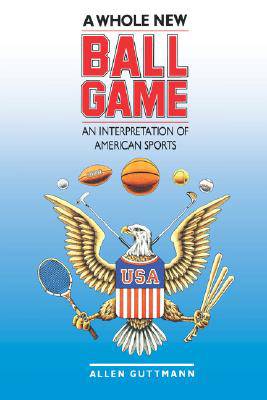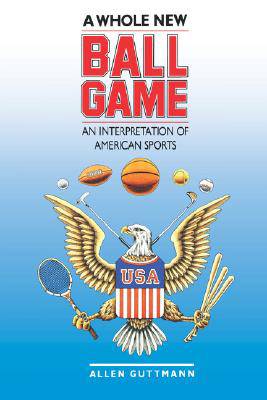
- Retrait gratuit dans votre magasin Club
- 7.000.000 titres dans notre catalogue
- Payer en toute sécurité
- Toujours un magasin près de chez vous
- Retrait gratuit dans votre magasin Club
- 7.000.0000 titres dans notre catalogue
- Payer en toute sécurité
- Toujours un magasin près de chez vous
57,95 €
+ 115 points
Description
Sports in America, particularly big-time collegiate and professional sports, have never been more popular. Modern sports events bring us breathtaking demonstrations of grace and power and provide the focal point for the leisure time of hundreds of thousands of Americans. But the world of sports is also increasingly a scene of moral corruption and physical abuse. In A Whole New Ball Game, Allen Guttmann examines the American fascination with sport and what that fascination reveals about our culture.
Like the transformation of American society in the twentieth century, the modernization of American sports has seemed inevitable and ubiquitous. As Guttmann shows, American sports reflect American culture: our sports are secular, bureaucratic, and specialized, and as part of our democratic society, they require at least in theory an equality among competitors. The rules of modern sports reflect their evolution from earlier, less differentiated games. To master the skills required by modern sports, athletes train scientifically, employing the most technologically advanced equipment. And, like almost every other aspect of our lives, sports are quantified: our athletes and the media are almost obsessed with records.
In tracing the development of modern sports in America from the rituals of pre-Columbian cultures to the late-1980s in this book, Guttmann discusses the failure of colonial New England and the antebellum South to influence the evolution of sports. He shows how baseball, a sport that combines premodern and modern characteristics, performed important social functions, helping to Americanize generations of immigrants. Examining basketball as the archetypal modern sport, Guttmann discusses its invention in the YMCA and its vulnerablity to corruption by gamblers, and he provocatively reviews the transformation of informal chlidren's play into adult-sponsored leagues.
One chapter of this important study offers and engrossing account of the female athletes's transition from social outcast to superstar; another scrutinizes the failure to achieve racial equality in sports. Guttmann also presents a scathing analysis of the destruction of the athlete's body through drug use and an examination of the search for alternative forms of physical activity. A Whole New Ball Game demonstrates conclusively that sports are an integral part of modern society and that, taken as a whole, they may be the best indicators we have of who we are as a people.
Like the transformation of American society in the twentieth century, the modernization of American sports has seemed inevitable and ubiquitous. As Guttmann shows, American sports reflect American culture: our sports are secular, bureaucratic, and specialized, and as part of our democratic society, they require at least in theory an equality among competitors. The rules of modern sports reflect their evolution from earlier, less differentiated games. To master the skills required by modern sports, athletes train scientifically, employing the most technologically advanced equipment. And, like almost every other aspect of our lives, sports are quantified: our athletes and the media are almost obsessed with records.
In tracing the development of modern sports in America from the rituals of pre-Columbian cultures to the late-1980s in this book, Guttmann discusses the failure of colonial New England and the antebellum South to influence the evolution of sports. He shows how baseball, a sport that combines premodern and modern characteristics, performed important social functions, helping to Americanize generations of immigrants. Examining basketball as the archetypal modern sport, Guttmann discusses its invention in the YMCA and its vulnerablity to corruption by gamblers, and he provocatively reviews the transformation of informal chlidren's play into adult-sponsored leagues.
One chapter of this important study offers and engrossing account of the female athletes's transition from social outcast to superstar; another scrutinizes the failure to achieve racial equality in sports. Guttmann also presents a scathing analysis of the destruction of the athlete's body through drug use and an examination of the search for alternative forms of physical activity. A Whole New Ball Game demonstrates conclusively that sports are an integral part of modern society and that, taken as a whole, they may be the best indicators we have of who we are as a people.
Spécifications
Parties prenantes
- Auteur(s) :
- Editeur:
Contenu
- Nombre de pages :
- 243
- Langue:
- Anglais
Caractéristiques
- EAN:
- 9780807842201
- Date de parution :
- 31-05-88
- Format:
- Livre broché
- Format numérique:
- Trade paperback (VS)
- Dimensions :
- 137 mm x 229 mm
- Poids :
- 340 g

Les avis
Nous publions uniquement les avis qui respectent les conditions requises. Consultez nos conditions pour les avis.






